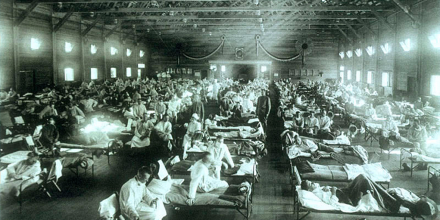The great influenza pandemic of 1918-20: An interpretative survey in the time of COVID-19

Event details
ACDE Seminar
Date & time
Venue
Speaker
Contacts
The Great Influenza Pandemic of 1918-20—commonly known as the Spanish Flu—infected over a quarter of the world’s population and killed over 50 million people. It is by far the greatest humanitarian disaster caused by infectious disease in modern history. Epidemiologists and health scientists often draw on this experience to set the plausible upper bound (the ‘worst case scenario’) on future pandemic mortality. The purpose of this study is to piece together and analyse the scattered multi-disciplinary literature on the pandemic in order to place debates on the evolving course of the current Covid-19 crisis in historical perspective. The analysis focuses on the changing characteristics of pathogens and disease over time, the institutional factors that shaped their global spread, and the demographic and socio-economic consequences.
Updated: 20 April 2024/Responsible Officer: Crawford Engagement/Page Contact: CAP Web Team






